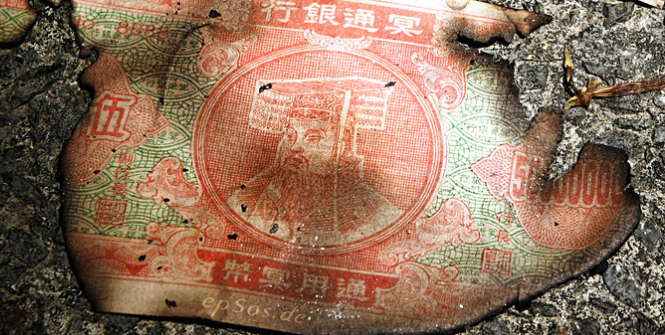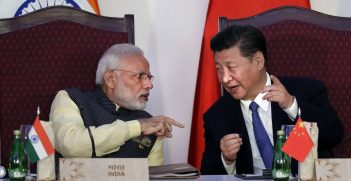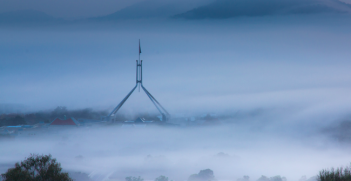China: Engage and Hedge Are Different Universes

As China faces a shock on their stock market, Graeme Dobell argues that China is not a house of cards about to collapse but that the Chinese economic model is sustainable.
China’s economy may be facing its 1929 moment. Or this may be only the painful burst of a big bubble. Will it become a cascading catastrophe or just a crashing correction?
Pay your money and place your bets. And hold your breath. No jests about a Communist Party flummoxed by the workings of a central motif of capitalism, please.
The obvious point for Australia is that Greece is concerning but China is the main event. For Oz, Chinese investors panicking at plunging values trump Greeks shaken by the shrivelling of their economy.
In the 20th century, recession in Europe and America meant something similar would happen in Australia. In the 21st century, Australia’s economy has decoupled from the US economy. America gets pneumonia but Australia doesn’t sneeze. Plugged into Asia, Australia sailed past the US dotcom bust and the Great Recession. Australia is coupled to Asia. And at the head of the train is China.
As the IMF noted, Australia’s decoupling from America’s economy, made explicit at both ends of the previous decade, means the US negative effect on Oz is ‘no longer statistically significant’.
A huge shift of historic dimensions. Ho hum, say the nation of pragmatists who live in Oz. Old news. Got the Asian Century memo, thanks, understood the point. The calm rests on the reality that so far the decoupling from the American economy and the firm coupling to Asia has delivered copious good news.
China’s market mayhem highlights another great decoupling—the parting of the ways of Engage & Hedge. This is the grand strategy that the US and Australia have employed towards China since the end of the Cold War. Engage economically. Hedge militarily.
Engage & Hedge were never really closely aligned or tightly joined. Now, though, they exist in different universes. Engage & Hedge can no longer be seen as the twin legs of a coherent strategy.
Two concepts supposed to run at least in parallel aren’t even in parallel universes. They have become policy poles with opposed existences. That’s why the US effort to create a Trans-Pacific Partnership excluding China is much more about the Hard-Power-Hedging universethan the Win-Win-Engage-and-Trade universe.
Tony Abbot got the terms of the decoupling into one vivid phrase when he said that Australia’s policies towards China are driven by two emotions: ‘fear and greed.’ The fear demands strategic hedging and the greed fuels economic engagement. These are opposed, not linked emotions. Off in their different universes, fear and greed no longer feed into a united policy recipe.
Fear of the hedging universe is going to keep growing whether China booms or busts. A rich China has shown it can be aggressive and assertive, A China that suddenly confronts the danger of being poorer than the trend line promised might be worse.
A Communist Party that can’t deliver ever-enriching growth has to play instead to the emotions of pride and nationalism (and belligerent fear of the perfidious foreign powers that seek to block China’s rise). The world’s second biggest economy is plenty big enough to matter, no matter what happens next. So whether China goes up or down, the demands of hedging just increase. Not much linkage there between Engage & Hedge.
Kevin Rudd captures the truth of the decoupling of Engage & Hedge in his Harvard report describing ‘the emergence of an asymmetric world in which the fulcrums of economic and military power are no longer co-located, but, in fact, are beginning to diverge significantly.’
The Ruddster is a sensitive and difficult subject in Oz. It’s going to take a long time for Australia—much less the Labor Party—to get over The Kevin. So approach the Rudd study via a recommendation from a fine former Foreign Minister, Gareth Evans, who nominates Rudd as the smartest guy in the room:
‘Rudd’s recommendations are undoubtedly ambitious. But, given his credentials—he is a formidable Chinese linguist and creative policy thinker, with long and close personal relationships with key figures in both the US and China—his argument must be taken seriously. Indeed, though Rudd’s tenure as Australia’s prime minister was anything but smooth, his sheer force of intellect is unmatched by that of any public figure with whom I have interacted over the last 30 years. (Not that this will much help his evident willingness to be drafted as the next UN Secretary-General: in that role the major powers have always preferred bland secretaries to creative generals.)’
Rudd advocates a new framework of ‘constructive realism’ between the US and China. The choice he describes is stark. Either China and America create a common understanding of mutual benefit and achievement—including a common strategic narrative—or they will drift toward conflict.
The Engage policy must become so dominant and so central that it changes the colour of the sky in the Hedge universe. A big, big ask. Kevin is always ambitious.
Kevin being Kevin, he asks and then answers seven core questions on the rise of China. And publishing a couple of months before the crashing sounds out of Shanghai, Rudd offers his answer about whether we are seeing catastrophe or mere painful correction.
‘Sorry,’ he writes, ‘but on balance the Chinese economic model is probably sustainable.’ That confident prediction about China’s next decade is about to get an extreme pressure test.
Graeme Dobell is a Fellow of the Australian Institute of International Affairs (FAIIA) and the ASPI journalist fellow. This article was originally published in the ASPI Strategist on 13 July 2015. It is republished with permission.




